We’re a team of three dietitians, so we get a lot of questions about the types of supplements that pair best with a healthy diet. We all take some supplements regularly and two of the three of us use a daily probiotic. So we all decided to test Seed for ourselves.
In this Seed probiotic review we’ll highlight the benefits of taking a synbiotic, why Seed is different from other probiotics and synbiotics you can buy, and our personal experience with it. We published our first review in April of 2023 and recently updated it again with another years’ worth of our experiences.
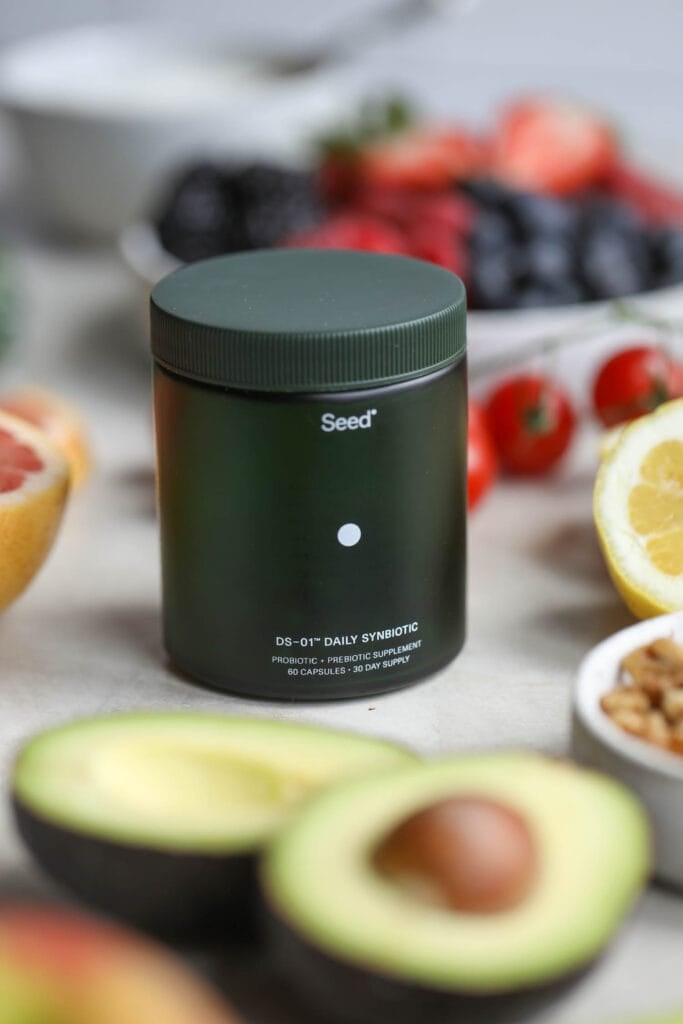
Want to save this page?
Enter your email below & we’ll send it straight to your inbox. Plus you’ll get great new recipes from us every week!
Our Verdict
All three of us took Seed probiotic for three months, two of us continued to use it after six months, of one of us (Stacie) still uses it after one year.
I (Jessie) felt that taking a daily probiotic wasn’t necessary for me and it didn’t stick as part of my routine. After several months, Jess switched to a different probiotic that seems to work better for her. And Stacie still continues to opt for Seed. That’s the way it tends to be with probiotics: If you’re going to take one, you need to do a little experimenting until you find one that checks all the boxes for you, individually.
“If I’m going to spend money on a probiotic, I want to be sure that it’s effective, and I believe that Seed is. I like that it delivers probiotics to my colon where they’re most effective, and I also appreciate the extensive third-party testing Seed does.”
Stacie Hassing, RDN
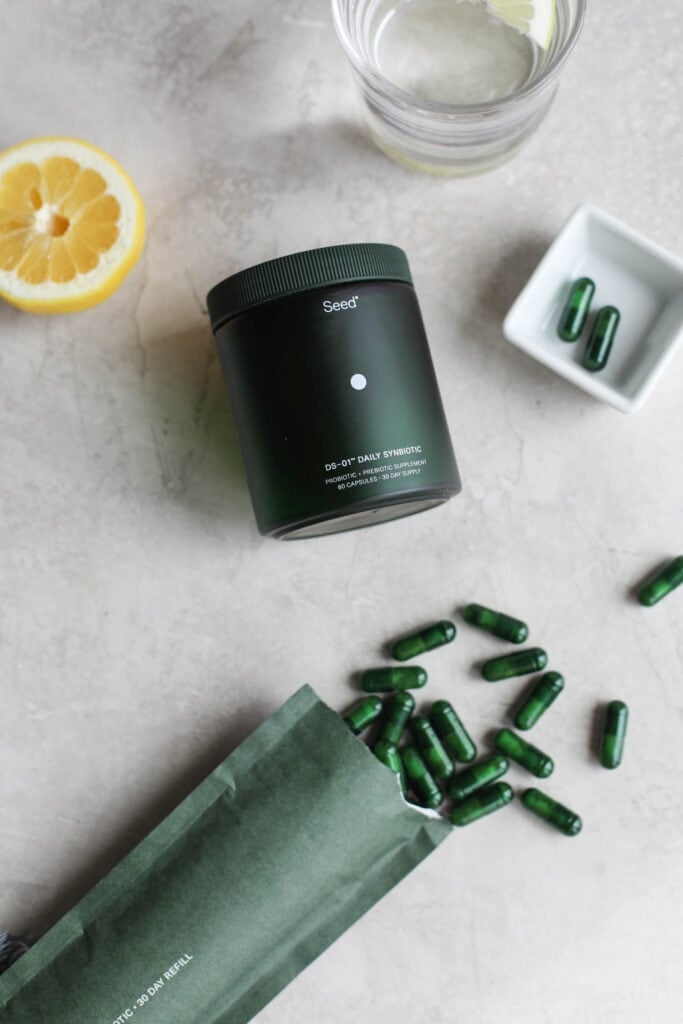
Pros and Cons
We know you’re busy, so we’ve compiled our experiences into a quick glance of pros and cons. We want you to have the info you need to make the decision for yourself when it comes to Seed.
| Pros | Cons |
|---|---|
| It’s a very high-quality effective synbiotic with 24 strains of probiotics plus prebiotics | Since it contains so many strains, including many your body may not be used to at first, you may experience diarrhea or constipation for a few days when you first start taking it |
| The brand goes above and beyond with clinically studied strain-specific benefits for even more than gut health, with the potential to also have a positive effect on things like heart health, skin health, and synthesis of micronutrients | It’s on the expensive side, costing $1.60 per serving (or $0.80 per capsule). Shipping is free. |
| We really love the convenience of having it ship right to our doors and that the packaging is so earth friendly – no plastic waste! | |
| We appreciate the built-in flexibility for orders. You can choose to have a refill shipment sent every month, every 3 months, or every 6 months, plus you can reschedule or cancel without fees | |
| The free glass travel vial that comes with the first order makes it so easy to pack your probiotics for a trip | |
| We love that the company also sells a research-backed powder pediatric synbiotic that is specially formatted for kids ages 3-17 |
Why We Tested It
We had been getting some questions from readers like you about our thoughts on Seed. So we reached out to the company and they sent the three dietitians on our team a starter kit and a few months worth of their daily synbiotic and pediatric synbiotic, and thus our testing began.
Our One-Year Review
When we started using it at the 2 capsule/day dose, we each had some acute diarrhea. This is a normal reaction to starting a new probiotic, especially one with so many unique strains. For two of us, that stopped after two days, and within one week we all noticed more regular and easy-to-pass bowel movements without any side effects or intestinal symptoms.
Stacie noticed less bloating and more frequent bowel movements within just a few days. We did not necessarily notice better or worse skin. And we trusted that we were getting some of those “hard to see” benefits, such as cardiovascular support, improved micronutrient absorption, and stronger immunity. Know that, as a group, we tend to stay pretty healthy and free from many bacterial and viral infections, so immunity was a hard one to test.
Jess ended up switching to a different synbiotic after six months and I decided that I don’t need to take a synbiotic. Stacie continues to use Seed after one year. She puts a lot of stock in the science-backed formulation of probiotics and prebiotics, Seed’s capsule technology, and that the company monitors purity under U.S. and European protocols.
We realize that it’s not the cheapest probiotic out there, but you get what you pay for with Seed. If you’re looking for an effective probiotic, you really can’t beat a high-quality one like this that’s clinically studied on humans.
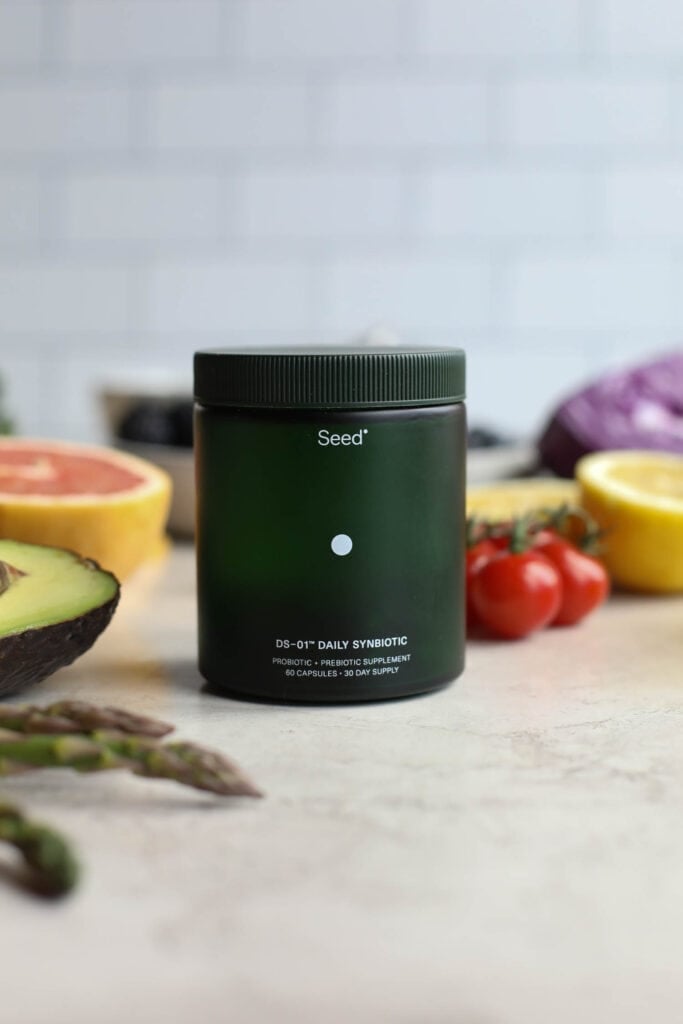
What Is A Synbiotic?
You may have noticed on the photo of the packaging above that Seed is labeled as a “daily synbiotic.” A synbiotic is a prebiotic and probiotic together in one. It goes above and beyond the average probiotic supplement in that it’s a broad-spectrum formulation of certain fibers (the prebiotics) plus beneficial bacteria strains (the probiotics). Seed’s synbiotic is specially designed to deliver strains to the lower digestive system tract where the vast majority of your gut microbiome lives.
Benefits Of A Synbiotic
A synbiotic is a mix of both probiotics and prebiotics so, in theory, you’re getting health benefits from both of them. While probiotic benefits are well established by science, the literature on synbiotics is scant. Here’s a high level look at the combined benefits you might get from taking a synbiotic:
Prebiotic benefits
- Regulating digestion and making bowel movements more consistent
- Improving calcium absorption and increasing bone density
- Helping to regulate blood sugars and increasing insulin sensitivity
- Stimulating the production of hormones that aid in appetite suppression
Probiotic benefits
- Relief or prevention of digestive issues, including diarrhea, constipation, IBS, IBD, Cronhs’ disease, ulcerative colitis, bacterial infections
- Increased nutrient absorption by breaking down anti-nutrients
- Stronger immunity by strengthening the intestinal epithelium (your gut lining)
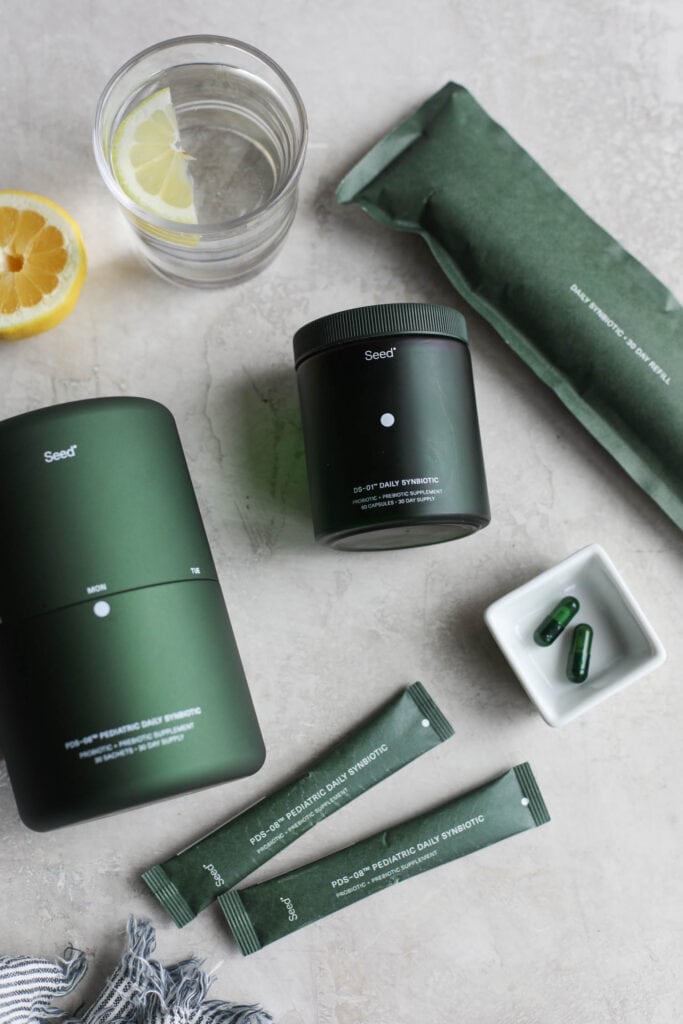
How It’s Different from other Probiotics And Synbiotics
We love that there are clinical trials to back up the potential benefits of the strains found in Seed, specifically. Those include:
- Digestive Health – Seed DS-01 Daily Synbiotic supports gastrointestinal health in order to support regularity of bowel movements and ease bloating while reinforcing healthy stool hydration and ease of evacuation.
- Gut Barrier Integrity – May reinforce healthy tight junctions along the gastrointestinal walls.
- Gut Immune Function – Helps promote healthy immune systems responses in the gastrointestinal tract and supports production of short-chain fatty acids which in turn nourish the cells of the large intestine and colon.
- Cardiovascular Health – Helps maintain cholesterol levels already within the healthy range and helps support healthy recycling of cholesterol and bile within the body.
- Micronutrient Synthesis – Supports folate production via intestinal synthesis of bioactive forms of folate and may support the synthesis of Vitamin B12.
- Support Skin Health – Supports dermatological health via the gut-skin axis.
As with all supplements, these claims have not been evaluated by the Food and Drug Administration. This product is not intended to diagnose, cure, treat, or prevent any diseases.
What’s Inside A Seed Capsule?
In each 2 capsule dose you get:
- 53.6 billion AFU (active fluorescent units) in 24 probiotic strains
- Prebiotic sourced from Indian pomegranate
- A ViaCap® 2-in-1 capsule that nests the probiotic inner capsule inside a prebiotic outer capsule, thus protecting the bacteria from oxygen, moisture, heat, light, and even stomach acid so it has a better chance of getting into your colon. The outer capsule is made from chlorophyllin and the inner capsule is made from hypromellose, fermented gellan gum, and water
- No binders and free of preservatives. Does contain organic rice fiber
- Free of all top allergens including wheat, corn, soy, dairy, eggs, fish, shellfish, sesame, tree nuts, and peanuts
- No animal byproducts, gluten, or sugar
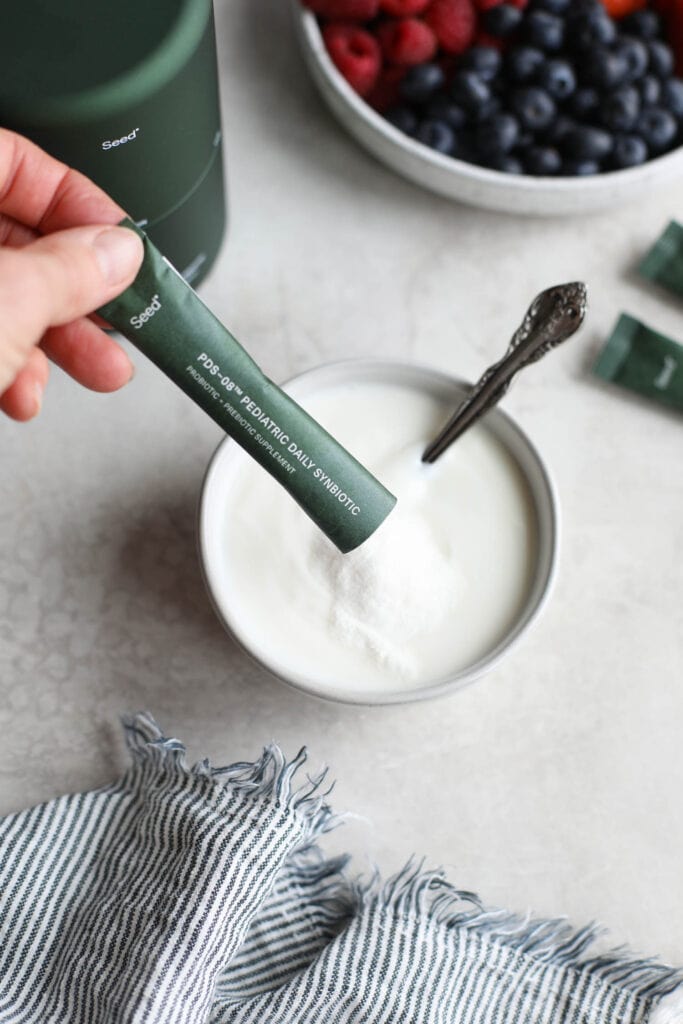
The DS-01® Daily Synbiotic is a 24 strain probiotic plus prebiotic for adults 18 years of age and older.
PDS-08TM Pediatric Daily Synbiotic is formulated with 9 probiotic strains plus prebiotics for children ages 3-17.
Instead of capsules, the pediatric synbiotic comes in single-use sachets that make it easy to dose the right amount. You mix the content of the sachet into cold or room temperature soft foods (such as yogurt or applesauce) or a liquid (water, milk, or smoothie). The first order of sachets comes with a metal storage container with a “days of the week” marked to help you remember to take it.
Cost: We Break It Down For You
Seed costs $49.99 per month or $1.60 per day (if you take it daily). Refills come in a 30-day supply that you just add right to your reusable glass jar. Place your first order at Seed.com and use code 25REALFOOD for 25% off your first month’s supply of Seed DS-01® Daily Synbiotic OR Seed PDS-08™ Pediatric Daily Synbiotic.
We love Seed’s focus on sustainability and non-plastic packaging. Your first box, or Welcome Kit, includes:
- Refillable glass jar that contains your first 30-day supply of DS-01TM
- Complimentary travel vial to take your probiotics with you when you’re on the go
- Recyclable shipping box made from eco-friendly paper crafted from algae
- A bio-based tray that is recyclable and home compostable
- Refills arrive in a pouch made with corn-based materials that are curbside- or home-compostable
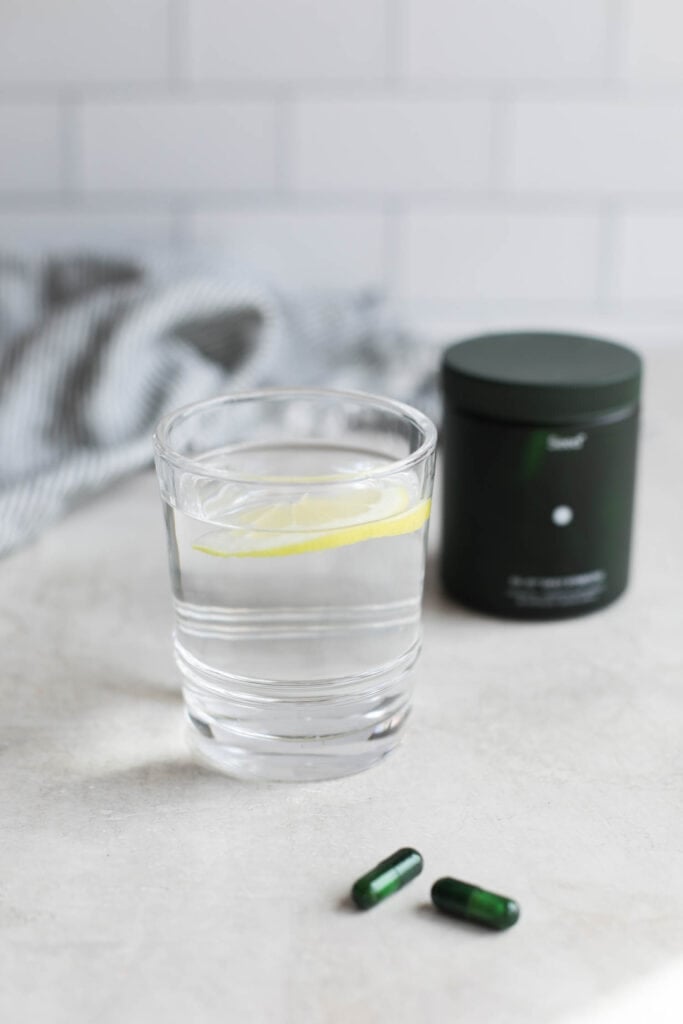
How To Take It
The recommendation is to take 2 capsules a day on an empty stomach with a glass of water. They can be taken first thing in the morning or before bed, whichever is easiest for you and fits into your routine. There’s no need to keep them in the refrigerator because they’re shelf-stable so if keeping them next to your toothbrush in your bathroom helps you remember to treat yourself to that good bacteria, then do what works for you.
Where to Buy It
Seed adult daily synbiotic and pediatric daily synbiotic is available as a monthly subscription through their website Seed.com. Because of the high-quality nature, you won’t find them on discount retail sites or Amazon. Your first order includes a glass jar with a 30-day supply of Seed plus a glass travel vial for taking Seed on the go with you. And shipping is free.
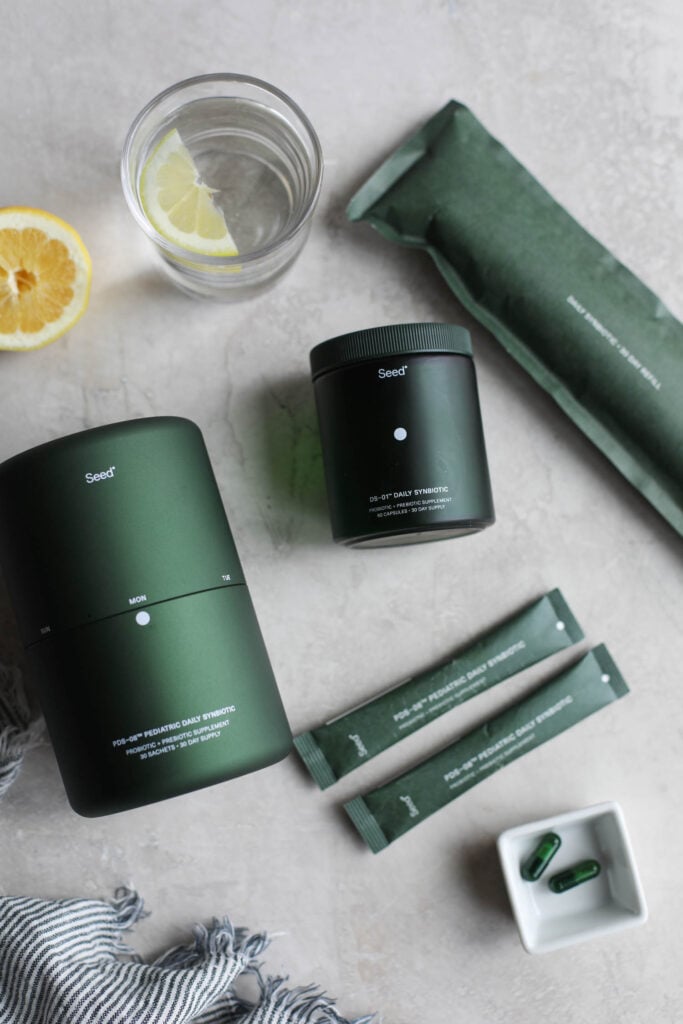
Frequently Asked Questions
A microbiome is a collection of all the microorganisms, microbes, and viruses that live in a given ecosystem, including the human body or part of the body, such as your digestive tract. When talking about the human digestive system, this is called your gut microbiome. Your body’s microbiome is a wonderfully complex system that affects everything from mood to immunity to weight loss.
Taking a daily prebiotic supplement (or synbiotic) is one of the best ways to help your gut bacteria thrive and to support overall healthy digestion.
In most probiotics, the amount of viable microbial cells is measured in CFU (colony forming units). While CFU remains the industry standard for measuring probiotics, there is a more precise alternative: AFU (or Active Fluorescent Units). While CFU is based on potential of microorganism colony growth, AFU counts viable microorganisms by laser.
While it may seem like a bigger number is better, that’s not always the case with probiotics and synbiotics. Instead, the quality of bacteria strains is a better indicator of good outcomes. Look for probiotic products that use strains that have been clinical studied in humans instead of those that just have a high number of CFU.
Seed was cofounded in 2015 by consumer tech entrepreneur Ara Katz and microbiome entrepreneur Raja Dhir. Its scientific board consists of scientists, researchers, doctors, and authors in the fields of microbiology, immunology, genetics, metabolomics, gastroenterology, pediatrics, molecular biology, and transcriptomics, including primary investigators from the NIH’s Human Microbiome Project.
All opinions in this Seed probiotic review are our own. We do receive an affiliate commission if you purchase Seed through our links. Before we were approved as an affiliate, we completed an educational course on the science behind Seed.
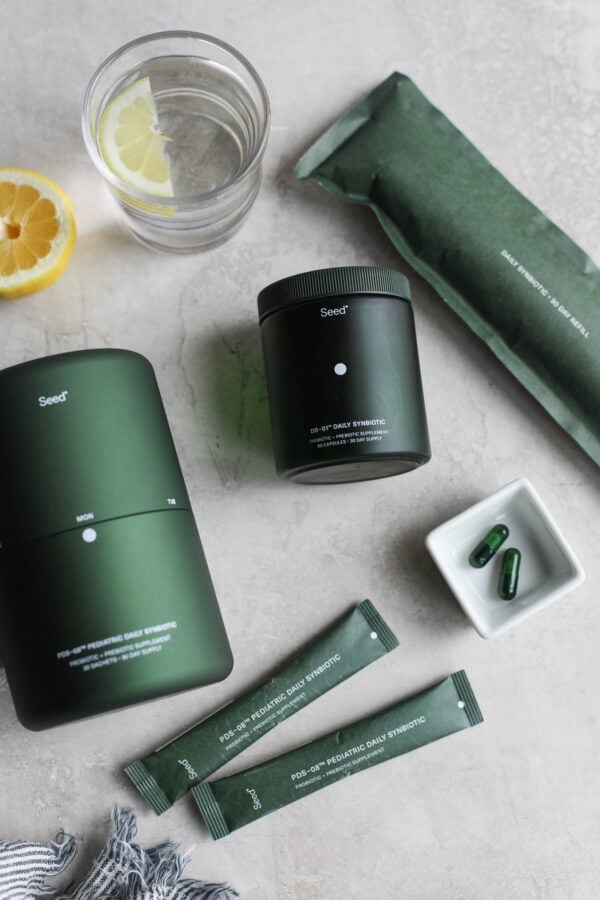
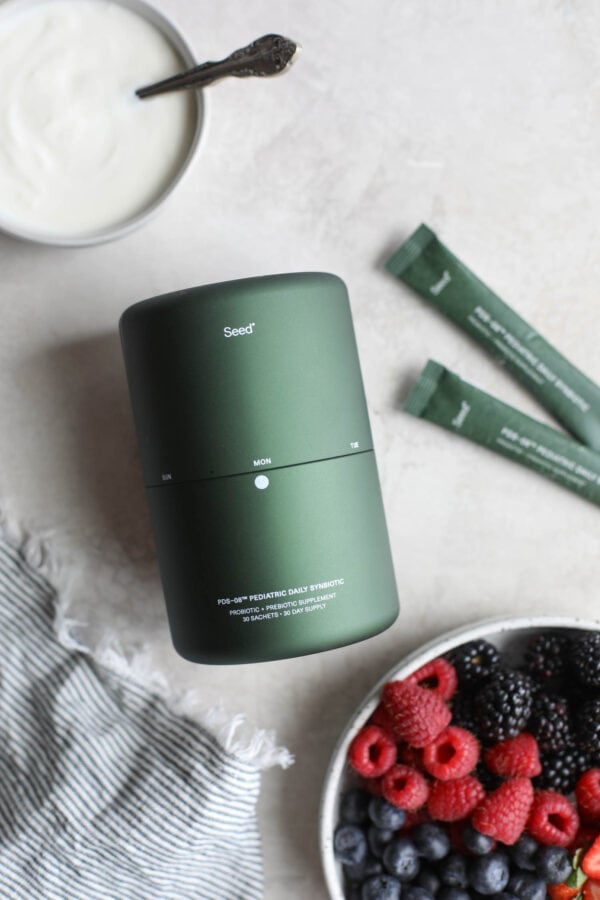
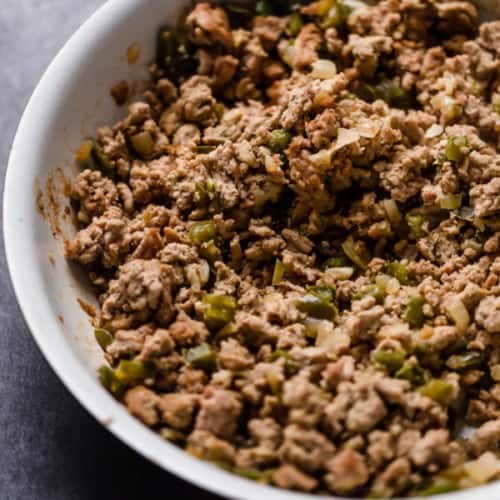

I took Seed and it gave me the worst diarrhea for days. So I stopped taking it immediately. If you do a little bit more research you’ll find reviews of people say it wiped out their gut bacteria.
Everyone’s tolerance to probiotics is different. I have experienced similar issues to probiotics myself and thus always recommend starting slowly and increasing the dose slowly over time (often a month or more). I would have to question those claims of ‘wiped out gut bacteria’ unless they were doing some sort of testing. That being said, intolerance is real and sometimes it takes considerable trial and error to find the right probiotic/prebiotic supplement.
I used the product and my bowels are soft all the time. Is that normal?.
Hi Yvonne, soft bowels are typically not a problem, but diarrhea is. If it continues beyond 2 weeks and is problematic for you, it would be best to chat with your provider or discontinue use, or consider switching to a different probiotic.
I’m wondering what the average retail is for Seed.
Thanks!
Hi Rob, Seed costs $49.99 per month or $1.60 per day (if you take it daily).
do you know if it is safe to take these if i have multiple sclerosis, rheumatoid arthritis, Lyme and alpha-gal syndrome,? also safe with taking a steroid and a chemo pill the doc uses for the rheumatoid arthritis?,
Hello, we cannot say for sure, so this is a better question for your doctor who prescribed those medications and is closer to your health history.
I have been on seed for about a month and 1/2 and so far is good. Regularity was my concern and bloating. Are there other options with good research you have seen? I want to try a couple until I see what works best for me.
Hi Ursula, we’re so glad to hear that. Seed is a really high quality option and definitely one of the best. The other synbiotic we have experience with is this one from Puori – Jess uses that one.